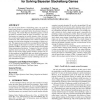1151 search results - page 51 / 231 » The role of game theory in human computation systems |
ICMLC
2005
Springer
14 years 1 months ago
2005
Springer
A novel method of Interactive Evolutionary Computation (IEC) for the design of microelectromechanical systems (MEMS) is presented. As the main limitation of IEC is human fatigue, a...
CORR
2004
Springer
13 years 7 months ago
2004
Springer
A growing body of literature in networked systems research relies on game theory and mechanism design to model and address the potential lack of cooperation between self-intereste...
ICAC
2009
IEEE
14 years 2 months ago
2009
IEEE
We apply the concept of “games with a purpose” to NPcomplete mapping and scheduling problems in distributed systems and report our experiences. The particular context is a sch...
SIGECOM
2006
ACM
14 years 1 months ago
2006
ACM
We study coalitional games where the value of cooperation among the agents are solely determined by the attributes the agents possess, with no assumption as to how these attribute...
ATAL
2008
Springer
13 years 10 months ago
2008
Springer
In a class of games known as Stackelberg games, one agent (the leader) must commit to a strategy that can be observed by the other agent (the follower or adversary) before the adv...

